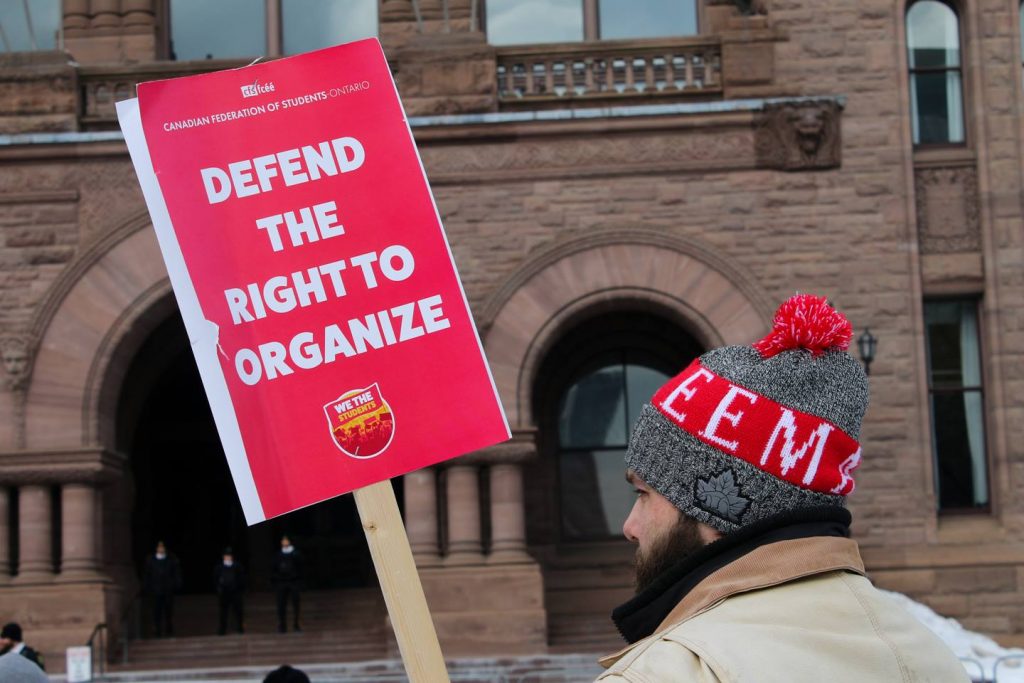There are no short cuts to creating the union or world we want

How Ontario Students’ Unions Fought for their Survival
In January 2019, I got a wakeup call that all union members and organizers need. I was more than halfway through my second term as Chairperson of the Canadian Federation of Students-Ontario (CFS-Ontario), where I represented over 350,000 domestic and international post-secondary students across the province. It had been a tumultuous few years, with campus conservatives (unsuccessfully) organizing to take over students’ unions, people like Jordan Peterson building a following and fighting against pronouns and gender neutral washrooms, anti-choice groups picketing campuses, and a handful of white nationalist groups calling for all-white students’ unions and “freedom of speech” as code for the freedom to hate. We knew that Premier Ford was no friend of progressives or the student movement so his election in June 2018 felt like a sucker punch. Our campuses were going through massive cultural and political shifts, and oftentimes it was students’ unions and campus groups that were fighting back and creating safe havens for members. Despite the challenges we faced, we were making progress on important student issues like access to grants instead of loans, sexual violence and harassment supports, and cutting red tape for international students to live and work in Ontario. It wasn’t all doom and gloom; however, the value of a provincial and national student movement was quickly put to test when Premier Ford announced the “Student Choice Initiative,” massive cuts to student financial aid and catastrophic changes to the funding formula for post-secondary institutions.
The Student Choice Initiative (SCI) was a policy directive, mandating universities and colleges to create an online platform where students could opt-out of their membership dues to students’ unions and campus groups. It was essentially Ford’s first underhanded attack at the Rand Formula, which requires students and workers to pay dues for the services of their school or workplace unions. With the SCI we were the guinea pigs. He touted this as a way to “put money back in people’s pockets,” using some of our own language to play on how expensive post-secondary education was. This directive was a problem because not only was it deceiving, it was also a direct attack on democratically established students’ unions and campus groups. Ford was not interested in saving students money—he (and his supporters) wanted to weaken the collective power and infrastructure that students have built over generations to hold governments like his accountable. He practically said so himself in a fundraising email. For years, the Progressive Conservative Party of Ontario had it out for students’ unions. Why? Well, students aged eighteen to twenty four popularly voted either NDP, Green, or Liberal based on their riding. Polling data also demonstrated that people were less likely to vote Conservative if they had a post-secondary degree. So, what better than to destabilize the breeding grounds for progressive organizing and political thought?
Going into post-secondary education often coincides with students’ first introduction to unionism and participation in democratic processes like elections and referenda. The spaces that students’ unions and campus groups create are where students develop their political ideology and find themselves and their communities. They’re also the places where students can access cost (and life) saving services like discounted transit tickets, food banks, or sexual violence and mental health supports. Students’ unions naturally drive change because it’s where students’ curiosities and interest come to life and where their skills, whether academic or personal, are finessed. On more than one occasion, students have shared how getting involved in a club, course union, campus paper, or their students’ union changed their life for the better.
After decades of government underfunding and piecemeal solutions in post-secondary, being a student in Ontario had become increasingly difficult. At the time, we were paying the highest tuition fees in the whole country and dealing with unaffordable housing, transportation, and food costs. Almost every student was working at least one job to make ends meet and unfortunately, it wasn’t unusual for students to have to choose between putting food on the table or buying textbooks. All this made the work of students’ unions and campus groups so crucial. But naturally, many members thought that the SCI would be a good cost saving measure without realizing what it meant for these places to be defunded.
The SCI was my first introduction to Ford’s communications playbook. He brilliantly announced this “money saving” measure alongside a 10% tuition fee freeze. I had no idea how we were going to clap back without sounding alarmist because how could the largest students’ union in the province be against putting money back in students’ pockets or a 10% tuition fee freeze?
All I knew was that we had to act quickly because if we didn’t, students would be worse off for generations to come. We had to fight back with every tool in our toolbox.
How we got organized
We took two routes to fight back—first, we launched a large-scale campaign to show the value of our students’ unions and campus groups. When the SCI was announced, we had about five months to get organized before students enrolled in courses for the following academic year. Ford purposefully made the opt-out of membership dues an online process because he did not want us connecting with members. It was a testament to that fact that we always win the hearts and minds of our members when we organize. At the CFS-Ontario, we supported students’ unions and campus groups across the province in creating campaigns that spoke about the importance of being a union member. We highlighted key aspects like our past victories, cost-saving services created by and for students, our democratic processes and the importance of pooling our resources to fight for students’ rights and values. Then we made sure that we spoke to every single student, campus group, course union, news outlet, elected representative, labour union, and parent. We had flying squads, rallies, regional organizing meetings, walk-outs, sit-ins, and other actions to ensure that people knew exactly how damaging Ford’s government and the SCI was. It was important to send a clear message to the Ford government that students would not fall for their lies, that we were united against his attacks to destabilize us, and that the real issue was the cost of tuition fees, not our students’ unions and campus groups.
In tandem, we filed a legal challenge against the policy directive because the SCI went against students’ right to organize. Though Ontario does not have formal legislation that protects students’ unions like Quebec does, there was enough precedence to stop the government from easily dissolving them. The Ontario courts also questioned Ford’s true intentions about saving students money, given that he also cut financial aid at the same time. The government tried to claim that the SCI brought along more transparency and choice but the court judges rightfully highlighted the fact that students already had that through democratic processes like students’ union and campus group elections and referenda. I’ll admit that I was very scared in January, but after each conversation with members and after our court date, I knew that we were going to win.
The campaign was exhausting, and the court decision felt like it took an eternity. But when we saw the final numbers of how many students remained members after course selection ended and we won our court challenge against the Ontario government we felt invincible. It was a much-needed reminder that our students’ unions and campus groups were worth fighting for and that the students united will never be defeated.
Key lessons
Shortly after we won our legal challenge, the world was thrust into a pandemic that changed everything. The landscape in education, health care, and labour has changed drastically and people across the province are struggling more so than they were before. Despite Premier Ford being re-elected to a second term, I know we can create strong unions and the society we envision if we implement these key lessons:
- There are no short cuts to effective organizing. We cannot create the world that we want overnight. It takes time, so be thorough, patient, and dedicated to the people and causes you care about.
- Unions are only as effective as we make them. Our active participation is needed because no one else will fight for us like we do. Our bosses, administrations, and governments are going to play by their own rules. We cannot rely on them to get what we need.
- People want and need connection. We cannot take each other for granted or underestimate the value of finding common ground and purpose. It’s where we draw our strength from to fight for a better world.
- Every single person has an issue that matters to them. Take the time to really get to know people, what drives them, gets under their skin, scares them, and makes them happy.
- There are going to be tough questions so it’s important to have honest and tough conversations. Being critical is often what drives us to create change.
- We need to know our histories. We need to share stories, victories, and challenges; it helps remind us that we’ve won before, and we can win again.
- A better world is possible and it’s worth fighting for.
As union members, workers, students, and regular citizens, it is up to us to protect what we value. Don’t wait for an existential crisis to fight back and create the world or union you want.



Leave a comment